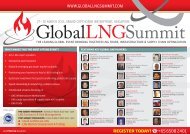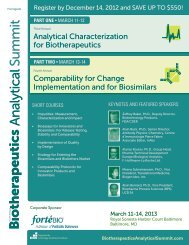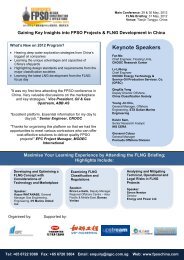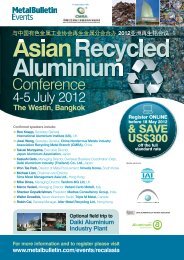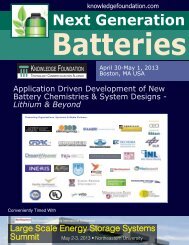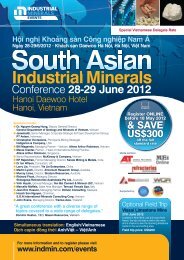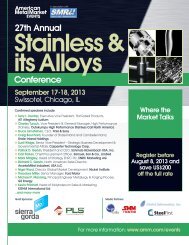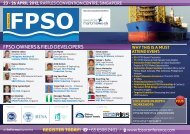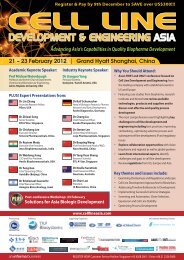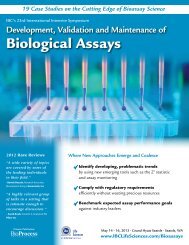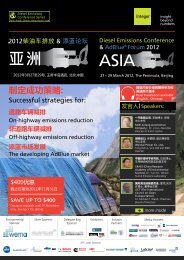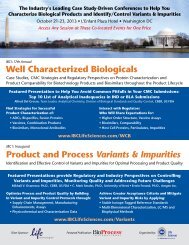Full Conference Details Inside
Full Conference Details Inside
Full Conference Details Inside
Create successful ePaper yourself
Turn your PDF publications into a flip-book with our unique Google optimized e-Paper software.
2:30<br />
Friday, October 12, 2012 (continued)<br />
Cell Culture Recovery & Purification<br />
3:00 Networking Refreshment Break<br />
3:30<br />
4:00<br />
4:30<br />
Development and Integration of a <strong>Full</strong>y Automated High-Throughput UNPUBLISHED<br />
Platform for Cell Line Selection and Cell Culture Development<br />
DATA<br />
This presentation will identify the advantages of integrating, within a single system, fully automated<br />
process workflows for both cell line and cell culture development. Both the development and<br />
implementation of an in-house, customized automation platform and software tools for data analysis<br />
will be highlighted. Data will be shared to illustrate key features of the platform and the impact on cell<br />
line selection and characterization. Results will illustrate how this approach increased efficiency and<br />
allowed for the processing of multiple cell line screening and cell culture development projects in parallel.<br />
John Cesarek, Staff Automation Engineer, Five Prime Therapeutics<br />
Disposables in Cell Culture<br />
Disposable Implementation in Conjunction with High<br />
UNPUBLISHED<br />
Throughput and Automation Technologies<br />
DATA<br />
A strategy will be presented applying targeted automation tools to resolve resource constraints in<br />
upstream development. This includes automated spin tubes for the elimination of manual shake<br />
flask stages during clonal evaluations. Development of a 250mL single use prototype bioreactor for<br />
both mammalian and microbial cultures designed to be implemented in an automated platform with<br />
robotic sampling, feeding and independent control. Finally, disposable perfusion systems to intensify<br />
cell culture densities to enable high protein production will be shown.<br />
Rachel Bareither, M.S., Research Biomedical Engineer, Bioprocess Development, Merck & Co., Inc.<br />
Take II – More Findings and Updates on Our Experiences with CASE STUDY<br />
Disposable Bags for Cell Culture Media Storage<br />
UNPUBLISHED<br />
Dr. Masaru Shiratori’s presentation at the 2011 BPI <strong>Conference</strong> & Exhibition in Long DATA<br />
Beach, CA investigated challenges associated with specific disposable bags and usage conditions that<br />
resulted in reduced cell growth and product yield. In this presentation, we will provide updates on the<br />
ongoing investigation and give an in-depth review of our current understanding of the root-cause of<br />
the problem. Lessons learned and recommendations for selecting disposables for future applications<br />
will be shared.<br />
Joseph Wood, M.S., Engineer I, Process Development Engineering, Genentech, Inc.<br />
Co-Development of a New 2-D Rocking-type Single-Use<br />
UNPUBLISHED<br />
Bioreactor to Streamline Cell Expansion Processes<br />
DATA<br />
Co-development by an equipment vendor and an operating company of a novel 2-D rocking<br />
bioreactor is presented. The rocking mechanism enables high oxygen transfer rates and the single-use<br />
bioreactor bag is designed to have a wide range of working volumes, eliminating labor-intensive multistage<br />
cell expansion trains. The bag is also fitted with integrated single-use sensors to allow better<br />
control of cell culture conditions.<br />
Bert Frohlich, Ph.D., Director, Bioengineering, Process Development, Shire Human Genetic Therapies, Inc.<br />
5:00 Close of BioProcess International TM <strong>Conference</strong> & Exhibition 2012<br />
Novel Single-Use Method for Concentrating and Purifying<br />
Therapeutic Cells and Incorporating Process Analytical Technology<br />
in Downstream Processing<br />
CASE STUDY<br />
As cell therapy lot sizes increase to larger scales, it will be important to apply scalable bioprocessing<br />
concepts and technologies to therapeutic cell production. We have developed and characterized a<br />
scalable, closed system concentration and purification technology for therapeutic cell processing<br />
based on Tangential Flow Filtration (TFF). Examples will be provided where disposable and noninvasive<br />
sensor technologies are used to acquire real time data to make process decisions, enhance<br />
process knowledge, monitoring process performance and product quality.<br />
Jacob Pattasseril, Engineering Manager, Cell Processing Technologies, Lonza<br />
Developing Downstream Processes for Next Generation and<br />
Novel Molecules<br />
Utilization of Fluidized Bed Centrifuge Technology for<br />
UNPUBLISHED<br />
Cell Therapy Bioprocess Development<br />
DATA<br />
A fluidized bed centrifuge (FBC) was used to process cell culture harvests by concentrating and<br />
washing cells for cell therapy applications. In cell therapy bioprocess development, it is crucial to<br />
take into consideration the capability to concentrate cells to an efficacious target dosage, dictated by<br />
viable cell density, as well as reducing remnants of cell culture impurities such as serum to acceptable<br />
levels. By optimizing FBC process parameters such as flowrates and centrifugal force, results showed<br />
that the FBC is effective in separating cells from the supernatant to achieve the targeted cell density<br />
dosage and at the same time efficient in the removal of undesirable impurities. Overall cell loss<br />
during processing was minimal thus achieving a high cell yield from the FBC. Detailed results will be<br />
discussed in the presentation.<br />
Paul Ko, Ph.D., Research Scientist, Cell Technologies, Janssen Research & Development<br />
Design Space Around a Non mAb Complex Protein Therapeutic CASE STUDY<br />
One of the important quality by design (QbD) concepts is to establish a design space<br />
around a drug product. This presentation discusses the development of a design space<br />
UNPUBLISHED<br />
DATA<br />
around one of our non mAb complex protein therapeutics. The minimal concentration requirement<br />
for the protein therapeutic is 20 g/L. Protein charge profiles were identified as a critical quality<br />
attribute that will affect the protein solubility. An ion exchange (IEX) chromatography step in the<br />
downstream process was identified as a critical step that will impact the protein solubility. A design of<br />
experiment (DoE) study was performed to define a design space to control the protein solubility. First,<br />
a risk assessment (FMEA) was performed to rank the process parameters in the IEX step. Second,<br />
the high risk parameters were screened by a high throughput screening (HTS) platform using Atoll<br />
Mini-columns. The significant parameters that might impact protein solubility, recovery, and impurity<br />
clearance were identified. Third, the significant parameters were further studied by scale down column<br />
runs to define a design space. Finally, a process control strategy was developed based on the DoE<br />
study results to better control the process performance and product quality.<br />
Yiming Yang, M.S., Senior Scientist, Purification Process Development,<br />
Shire Human Genetic Therapies, Inc.<br />
Development of an Integrated Protein<br />
UNPUBLISHED<br />
Reduction/PEGylation Platform<br />
DATA<br />
PEGylation has been shown to improve therapeutic protein half-life. A reduction and PEGylation<br />
process is optimized for a complex therapeutic protein to minimize by-product. The PEGylation<br />
efficiency is dependent of reductant and PEG concentrations as well as incubation time. The process<br />
is successfully incorporated into a scalable integrated platform where the entire reduction/PEGylation<br />
process is performed in a single unit operation.<br />
Brian To, Ph.D., Senior Staff Development Scientist, Isolation and Purification, Bayer HealthCare<br />
21 To Register, Call: (800) 390-4078 • Fax: (941) 365-0104 • E-mail: reg@ibcusa.com • www.IBCLifeSciences.com/BPI



